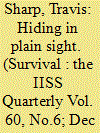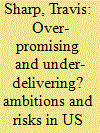|
|
|
Sort Order |
|
|
|
Items / Page
|
|
|
|
|
|
|
| Srl | Item |
| 1 |
ID:
162723


|
|
|
|
|
| Summary/Abstract |
Cyber operations may not impose much physical destruction, but they can squeeze at least three political pressure points: money, leadership and secrecy.
|
|
|
|
|
|
|
|
|
|
|
|
|
|
|
|
| 2 |
ID:
115277


|
|
|
|
|
| Publication |
2012.
|
| Summary/Abstract |
Recent changes to US defence strategy, plans and forces have placed the United States at greater risk of over-promising and under-delivering on its global security ambitions. In 2012, the Obama administration released a new defence strategic guidance document to adapt to a shifting security environment and defence budget cuts. The guidance upholds the two long-standing American goals of global pre-eminence and global reach, but seeks to apply this military power by using new planning and regional concepts. It revises the Department of Defense's force planning construct, an important tool used to size US military forces, and identifies the Asia-Pacific and the greater Middle East as the two regions where the US military should focus its attention and resources. There are three major risks facing this revised US strategy: emerging security threats, the role of US allies and partners, and domestic constraints in the United States. Included in these risks are the proliferation of advanced military technologies, the US response to the rise of China, the continued prevalence of state instability and failure, the capability and commitment of NATO and other US allies, additional US budget cuts, political polarization in the United States, and interservice competition within the US military. In light of these risks, the United States faces a future in which it will continue to struggle to direct its military power towards its most important geopolitical priorities, such as rebalancing towards the Asia-Pacific, as opposed simply to respond to the many security surprises that are certain to arise. If the past is any guide, American political leaders will respond to the aforementioned risks in the worst way possible: by maintaining the current US defence strategy while slashing the resources to support it.
|
|
|
|
|
|
|
|
|
|
|
|
|
|
|
|
| 3 |
ID:
111786


|
|
|
| 4 |
ID:
151231


|
|
|
|
|
| Summary/Abstract |
Track II diplomacy, or unofficial interactions designed to produce ideas, build relationships, and change perceptions, has become a supplement – and sometimes an alternative – to traditional diplomacy. Yet practitioners and scholars still debate its effectiveness. Practitioners claim that Track II diplomacy promotes peace but insist that its contributions are intangible and therefore difficult to assess empirically. Meanwhile, scholars maintain that only rigorous empirical evaluation can demonstrate the effect of Track II diplomacy on conflict outcomes. This study seeks to break this impasse in two ways. First, it provides a comprehensive explanation of why Track II practitioners object to evaluation, drawing on personal interviews conducted in eight countries. Second, it proposes a new evaluation framework, which we call the “Process Peace” approach, which better balances practitioner and scholarly equities. Our framework should appeal to readers interested in bridging the gap between the practice and theory of Track II diplomacy.
|
|
|
|
|
|
|
|
|
|
|
|
|
|
|
|
| 5 |
ID:
156669


|
|
|
|
|
| Summary/Abstract |
This article challenges the conventional wisdom that cyber operations have limited coercive value. It theorizes that cyber operations contribute to coercion by imposing costs and destabilizing an opponent’s leadership. As costs mount and destabilization spreads, the expected utility of capitulation surpasses that of continued defiance, leading the opponent’s leaders to comply with the coercer’s demands. The article applies this ‘cost-destabilization’ model to the 2014 North Korean cyber operation against Sony. Through cost imposition and leadership destabilization, the North Korean operation, despite its lack of physical destructiveness, caused Sony to make a series of costly decisions to avoid future harm.
|
|
|
|
|
|
|
|
|
|
|
|
|
|
|
|
| 6 |
ID:
084590


|
|
|
| 7 |
ID:
093514


|
|
|
|
|
|
|
|